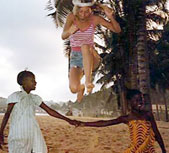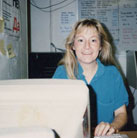
About Masha Hamilton
Masha Hamilton is the author of five acclaimed novels, most recently What Changes Everything, which the Washington Post praised for its "elegantly wrought prose (which) conveys terror as well as tenderness" and 31 Hours, which the Washington Post called one of the best novels of 2009. She was named the 2017 John E. Nance Writer-in-Residence at the Thurber House. In October 2013, she finished 16 months working in Afghanistan as Director of Communications and Public Diplomacy at the US Embassy. Masha worked two and a half years as Vice President of Concern Worldwide, wrapping up in May 2016. She is currently teaching and writing fulltime. She also founded two world literacy projects, the Camel Book Drive and the Afghan Women's Writing Project. She is the winner of the 2010 Women's National Book Association award, presented "to a living American woman who derives part or all of her income from books and allied arts, and who has done meritorious work in the world of books beyond the duties or responsibilities of her profession or occupation." She began her career as a fulltime journalist, working in Maine, Indiana and New York City before being sent by the Associated Press to the Middle East, where she was news editor for five years, including the period of the first intefadeh, and then moving to Moscow, where she worked for five years during the collapse of Communism, reporting for the Los Angeles Times and NBC-Mutual Radio and writing a monthly column, "Postcards from Moscow." She also reported from Kenya in 2006, and from Afghanistan in 2004 and 2008. She has been awarded literary fellowships at Yaddo, MacDowell, Dora Maar Brown Foundation Fellows Program, Blue Mountain Center, Virginia Center for the Creative Arts,Wellstone Center in the Redwoods and Turkey Land Cove Foundation.
 More on the novels: Staircase of a Thousand Steps (2001) was a Booksense pick by independent booksellers and a Barnes & Noble Discover Great New Writers selection; The Distance Between Us (2004), was named one of the best books of the year by Library Journal; The Camel Bookmobile (2007), also was a Booksense pick. Of that book, a New York Times review said: "Hamilton makes us see how much is really at stake in a poverty-stricken place where every possession carries the weight of significance." 31 Hours (2009) was called by Publisher's Weekly "gorgeous and complex." The Post wrote: "Hamilton has used both her considerable empathy as a writer and her experience in the Middle East to create an intimate portrait ... (She's) made it very hard to tear your gaze away." BookReporter.com founder Carol Fitzgerald called it "one of the best novels I've read this year." Best-selling author Meg Waite Clayton said of What Changes Everything (2013): "Every once in a while, a book comes along that makes you want to wrest even your own work from readers' hands and command that they read this instead." The Washington Post said its "elegantly wrought prose conveys terror as well as tenderness."
More on the novels: Staircase of a Thousand Steps (2001) was a Booksense pick by independent booksellers and a Barnes & Noble Discover Great New Writers selection; The Distance Between Us (2004), was named one of the best books of the year by Library Journal; The Camel Bookmobile (2007), also was a Booksense pick. Of that book, a New York Times review said: "Hamilton makes us see how much is really at stake in a poverty-stricken place where every possession carries the weight of significance." 31 Hours (2009) was called by Publisher's Weekly "gorgeous and complex." The Post wrote: "Hamilton has used both her considerable empathy as a writer and her experience in the Middle East to create an intimate portrait ... (She's) made it very hard to tear your gaze away." BookReporter.com founder Carol Fitzgerald called it "one of the best novels I've read this year." Best-selling author Meg Waite Clayton said of What Changes Everything (2013): "Every once in a while, a book comes along that makes you want to wrest even your own work from readers' hands and command that they read this instead." The Washington Post said its "elegantly wrought prose conveys terror as well as tenderness."
More on the literacy projects:
The Camel Book Drive was begun in 2007 to supply a camel-borne library in northeastern Kenya, and the Afghan Women's Writing Project was begun in 2009 to nurture and support the oft-silenced voices of Afghan women and foster creative and intellectual exchange between Afghan women writers and American women authors and teachers.
More on the journalism: As a foreign correspondent for The Associated Press for five years in the Middle East, she covered the intefadeh, the peace process and the partial Israeli withdrawal from Lebanon. In Moscow, she wrote about Kremlin politics as well as life for average Russians under Gorbachev and Yeltsin during the coup and collapse of the Soviet Union. In Kenya, she interviewed street kids in Nairobi and drought and famine victims in the isolated Northeast. In Afghanistan, she interviewed child brides, war widows, women drug addicts and traveled from Jalalabad to the Hindu Kush, from Herat and Mazar to Kandahar and Ghazni.

Author Interviews
- Watch Masha receive the 2010 WBNA Award
- LibraryThing Interview about
31 Hours - AuthorCast interview
about 31 Hours - FORA.tv: Masha discusses the inspiraton behind The Camel Bookmobile (Watch Video)
- O: The Oprah Magazine article
- Family Circle article
- "Live at ALA" radio show
- Masha speaks about the Camel Library (Watch video)
- Masha speaks at Southern Voices 2010 (Watch video)